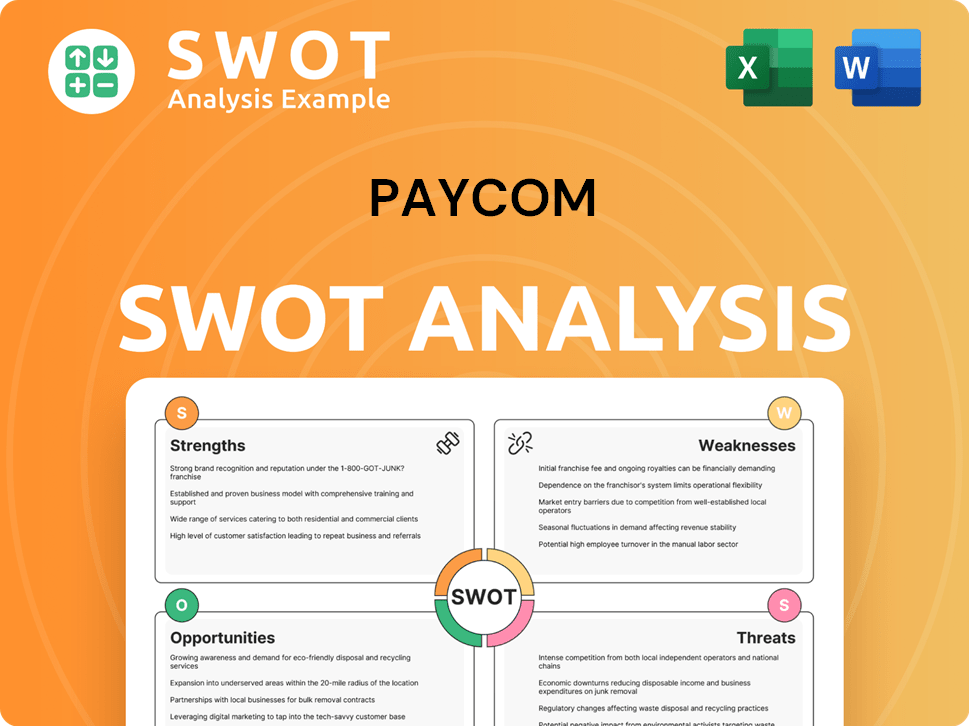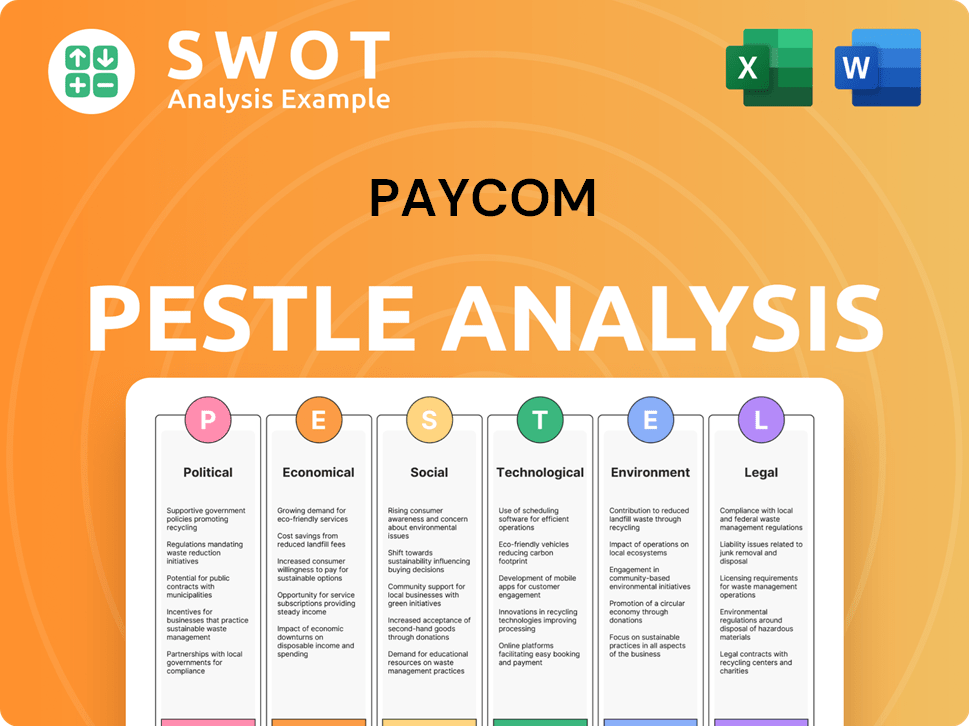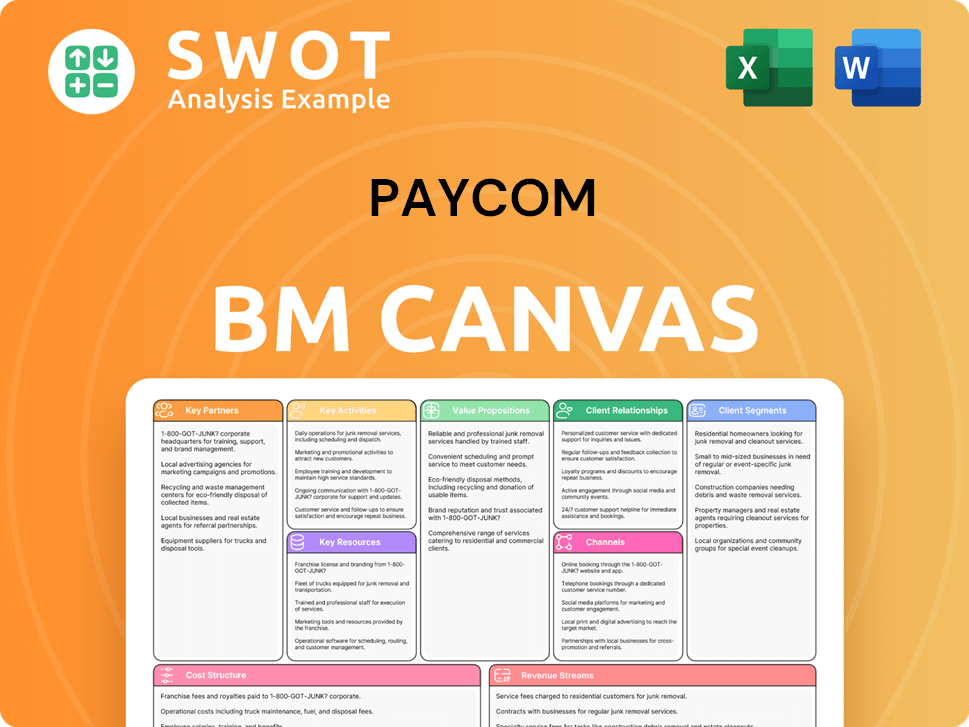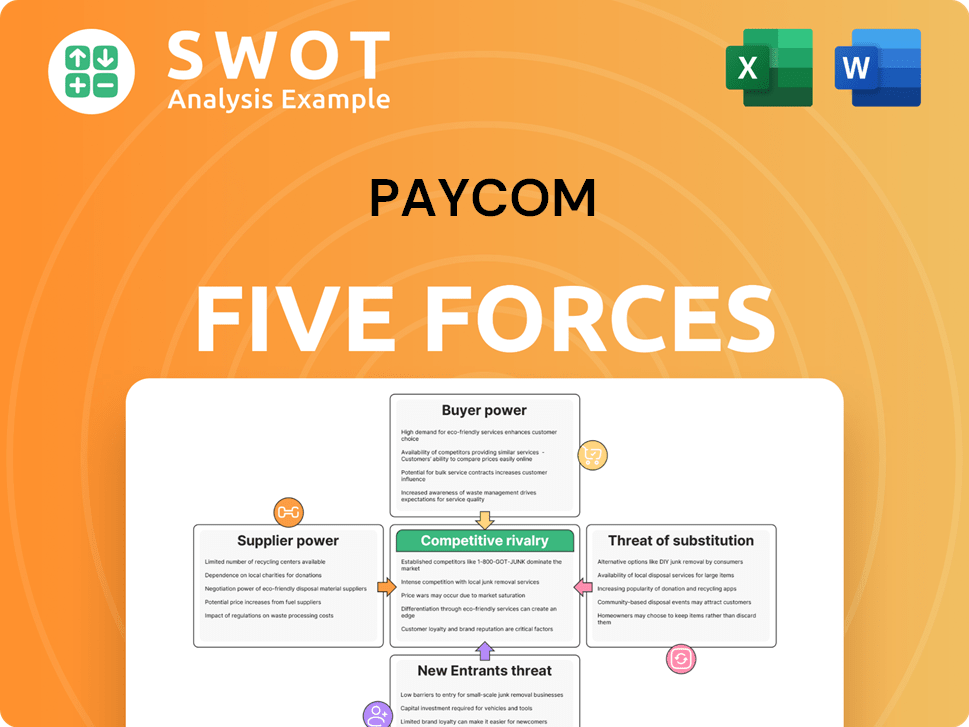Paycom Bundle
Can Paycom Continue Its HR Tech Dominance?
Paycom, a frontrunner in cloud-based human capital management (HCM) software, has strategically positioned itself for sustained growth. Its innovative product launches, including Beti and GONE, have reshaped payroll and time-off management, promising significant productivity gains. This Paycom SWOT Analysis will delve into the company's strategic initiatives and future outlook.

Founded in 1998, Paycom has evolved into a $12.7 billion market cap company, serving businesses across the U.S. and beyond. This Paycom company analysis will explore its expansion plans and strategies, examining its Paycom growth strategy and the factors influencing its Paycom financial performance. We'll also analyze Paycom's future prospects, taking into account industry trends and competitive landscape analysis to assess its long-term investment potential.
How Is Paycom Expanding Its Reach?
Understanding the expansion initiatives of a company like Paycom is crucial for a comprehensive Paycom company analysis. Paycom's growth strategy is multi-faceted, focusing on both geographical expansion and product enhancements to solidify its position in the human capital management (HCM) market. These strategies are designed to boost Paycom's market share and capitalize on industry trends.
The company's approach includes strategic moves to increase its customer base and diversify revenue streams. Paycom's expansion plans and strategies reflect a proactive stance in a competitive landscape, aiming to stay ahead of industry changes. This is essential for maintaining its long-term investment potential and achieving consistent Paycom financial performance.
Paycom's expansion efforts are a key component of its overall strategy. The company is actively working to enhance its offerings and extend its reach to new markets. These efforts are central to understanding Paycom's future prospects.
In January 2025, Paycom opened three new sales offices in Raleigh, North Carolina; Los Angeles, California; and Providence, Rhode Island. This brought the total number of outside sales teams to 57, indicating a strong focus on increasing market penetration within the U.S. This expansion is a key element of Paycom's client acquisition strategies.
Paycom is strategically expanding its presence in Europe, particularly after securing payment institution status in Ireland. This regulatory approval allows Paycom to operate more broadly in the European HCM market, estimated at $12 billion. This move is a significant step in Paycom's global expansion plans.
Paycom's Global HCM product already supports users in over 180 countries and is available in 15 languages and dialects. This comprehensive solution is designed to manage global workforces efficiently. This wide availability supports Paycom's ability to compete effectively in the global market.
Paycom's management emphasizes a strategic approach to entering new markets, focusing on accessing new customers and diversifying revenue streams. This approach aligns with the company's goals to stay ahead of industry changes and improve its long-term prospects. For more insights, consider analyzing the Competitors Landscape of Paycom.
Paycom's expansion initiatives are driven by the desire to access new customers, diversify revenue streams, and adapt to industry changes. These efforts are crucial for maintaining a competitive edge and ensuring sustainable growth. This approach is vital for Paycom's long-term success.
- Geographical expansion to increase market reach.
- Product enhancements to improve service offerings.
- Strategic market entry to capitalize on opportunities.
- Focus on customer acquisition and retention strategies.
Paycom SWOT Analysis
- Complete SWOT Breakdown
- Fully Customizable
- Editable in Excel & Word
- Professional Formatting
- Investor-Ready Format

How Does Paycom Invest in Innovation?
The innovation and technology strategy is a cornerstone of the Paycom growth strategy, driving significant advancements in human capital management (HCM) solutions. This focus is evident in the company's substantial investments in research and development, which directly contribute to its competitive edge. By consistently integrating cutting-edge technologies, Paycom aims to enhance its offerings and maintain its leadership in the HCM market.
Paycom's commitment to innovation is reflected in its development of user-friendly and efficient tools. These tools aim to streamline HR processes and improve the overall user experience. The company's strategic investments in technology and its focus on customer needs are key factors in its continued success and future expansion.
Paycom's Paycom future prospects are closely tied to its ability to innovate and adapt to changing market demands. The company's focus on automation and AI is designed to enhance its services and maintain its competitive advantage in the HCM sector. This proactive approach positions Paycom to capitalize on emerging opportunities and drive long-term growth.
Paycom's R&D investments totaled $242.6 million in 2024. This represents a 22% increase from $198.95 million in 2023. The company's R&D expenditure in Q1 2025 was $62.3 million.
Beti allows employees to process their own payrolls with AI-driven error detection. This solution significantly reduces payroll processing time by up to 90%. It also cuts time spent correcting payroll errors by up to 85%.
GONE, launched in December 2023, automates time-off requests based on customizable guidelines. It is projected to deliver a return on investment of up to 821% over three years. The tool was recognized with a top HR Product of the Year award in 2024.
Paycom is integrating AI to drive long-term revenue growth and enhance system accuracy. The company aims to understand user intent, particularly in payroll and HR processes. A new command-driven system is planned for introduction within two to three months.
Paycom's AI agent has reduced service tickets by over 25% year-over-year. It has also improved immediate response rates. The AI agent was launched six months prior to April 2025.
Paycom focuses on full-solution automation and high client ROI. This approach contributes to expanding margins and accelerating momentum. The company's strategic focus is yielding positive results in the market.
Paycom's commitment to innovation is evident in its technology strategy, which focuses on automation and AI to enhance its HCM solutions. This strategy is crucial for driving Paycom financial performance and maintaining its competitive edge in the market. The company's investments in R&D and its product development efforts are designed to meet the evolving needs of its clients and improve operational efficiency.
- Beti: This automated payroll solution allows employees to manage their own payrolls, leveraging AI for error detection.
- GONE: Launched in December 2023, this automated time-off management system is designed to offer a high ROI by automating time-off requests.
- AI Integration: Paycom is integrating AI across its platform to enhance accuracy, understand user intent, and streamline processes.
- Command-Driven System: A new AI-driven command system is planned, offering users simplified access to information and tasks.
- AI Agent: The existing AI agent has already reduced service tickets and improved response rates, demonstrating the effectiveness of AI in customer service.
For a deeper understanding of the company's foundational principles, consider exploring the Mission, Vision & Core Values of Paycom.
Paycom PESTLE Analysis
- Covers All 6 PESTLE Categories
- No Research Needed – Save Hours of Work
- Built by Experts, Trusted by Consultants
- Instant Download, Ready to Use
- 100% Editable, Fully Customizable

What Is Paycom’s Growth Forecast?
The financial outlook for Paycom is optimistic, with expectations of continued growth in the coming years. The company's strategic initiatives and focus on innovation are expected to drive further expansion and solidify its position in the human capital management (HCM) market. An analysis of Paycom's financial performance reveals a strong trajectory, supported by solid revenue growth and efficient operational management.
Paycom's financial strategy appears to be centered on sustainable growth, with a focus on expanding its market share and enhancing its product offerings. This approach is reflected in the company's revenue projections and its investments in technology and customer service. The company's financial health is further underscored by its robust cash position and lack of debt, providing a solid foundation for future investments and strategic initiatives.
The company's financial performance in the first quarter of 2025 and its projections for the full year indicate a positive outlook. This positive trend is supported by strategic initiatives aimed at expanding market share and enhancing product offerings. The company's commitment to innovation and customer satisfaction is expected to drive sustained growth and strengthen its position in the competitive HCM market. Understanding Revenue Streams & Business Model of Paycom can provide further insights into the company's financial operations.
Paycom anticipates total revenue for 2025 to be between $2.023 billion and $2.038 billion. This represents approximately an 8% year-over-year growth at the midpoint. Recurring and other revenue growth is projected to be around 9% year-over-year, indicating a strong performance in core business areas.
In Q1 2025, Paycom reported total revenues of $530.5 million, a 6.1% increase year-over-year. Recurring and other revenues reached $500.0 million, up 7.3% and accounting for 94.2% of total revenues. Non-GAAP net income was $157.7 million, or $2.80 per diluted share.
Adjusted EBITDA for Q1 2025 was $253.2 million, a 10% increase year-over-year, with a margin of 47.7%. For the full year 2025, adjusted EBITDA is expected to be in the range of $843.0 million to $858.0 million, with a margin of approximately 42% at the midpoint.
Paycom ended fiscal year 2024 with total revenues of $1.883 billion, up 11.2% from the previous year. The company has a strong cash position, with $520.8 million in cash and cash equivalents as of March 31, 2025, and no total debt.
Analysts forecast Paycom's EPS to be $6.99 for 2025, increasing 14.3% year-over-year to $7.99 in fiscal 2026. The company's consistent revenue growth and strong financial position suggest a positive trajectory, driven by its cloud-based payroll software and human capital management solutions.
- Paycom growth strategy focuses on expanding its market share through innovation and customer satisfaction.
- Paycom future prospects are positive, with expected revenue growth and expansion in the HCM market.
- Paycom company analysis reveals a financially strong company with a focus on sustainable growth and strategic investments.
- Paycom financial performance in Q1 2025 and the full-year 2024 show consistent revenue growth and profitability.
Paycom Business Model Canvas
- Complete 9-Block Business Model Canvas
- Effortlessly Communicate Your Business Strategy
- Investor-Ready BMC Format
- 100% Editable and Customizable
- Clear and Structured Layout

What Risks Could Slow Paycom’s Growth?
The growth trajectory of the company, a key aspect of its overall Paycom growth strategy, faces several potential risks and obstacles. These challenges span market competition, regulatory changes, macroeconomic pressures, and operational hurdles. Understanding these risks is crucial for a comprehensive Paycom company analysis and assessing its Paycom future prospects.
The HCM software market is highly competitive, with established players posing significant challenges to the company's market share. Additionally, macroeconomic factors and shifts in the labor market could influence the adoption of premium HR tools, impacting client spending. The company's focus on the small to mid-sized business sector makes it particularly sensitive to economic fluctuations.
Operational challenges, including international expansion and client retention, also pose risks. The company's ability to adapt its products to different regulatory environments and labor laws in new markets will be critical for its success. The company's management actively addresses these risks through strategic initiatives, focusing on service, automation, and client ROI.
The HCM software market is highly competitive, with established players like ADP, Workday, and Paylocity posing direct challenges. These competitors have also expanded their AI-driven payroll capabilities, intensifying the competition. Maintaining a strong growth trajectory is crucial for staying ahead and investing in innovation in this dynamic market.
Changes in employment laws, especially in new international markets, could necessitate costly updates to compliance features, impacting operational efficiency. Navigating the complexities of diverse regulatory landscapes is critical for sustainable growth. Staying compliant with evolving regulations is a key challenge.
Macroeconomic factors, such as a softening labor market or a recession, could slow the adoption of premium HR tools and affect client spending and transaction volumes. The company's target market of small to mid-sized businesses makes it sensitive to economic trends. Enterprise clients are becoming more selective in adopting automated payroll solutions due to economic uncertainties.
Execution risks associated with international expansion, such as adapting products to different regulatory environments and labor laws, and competing with local incumbents, are significant. Scaling new offices and sustained automation adoption among slower-adopting clients remain areas of concern. The company's ability to effectively execute its expansion plans will be a key determinant of its success.
While the annual revenue retention rate for 2024 was 90%, consistent with the prior year, retention challenges have been acknowledged. The market may face saturation, potentially limiting future growth opportunities. Maintaining high client retention rates is vital for sustained revenue growth and overall Paycom financial performance.
Interest rate declines are identified as a headwind for 2025, impacting interest income on funds held for clients. This financial impact is a factor in the overall Paycom industry trends and financial outlook. The company must manage its financial strategies to mitigate the impact of interest rate fluctuations.
The company's management actively assesses and prepares for these risks through strategic initiatives. These initiatives focus on world-class service, full solution automation, and high client ROI. Successful execution of these strategies will be critical for navigating the challenges and achieving the company's growth objectives. For more details on the company's performance, consider reading this article about the company's strategy.
A potential economic downturn could significantly impact the company's client base and revenue streams. The company's target market, consisting of small to mid-sized businesses, is particularly vulnerable to economic fluctuations. The ability to retain clients and attract new ones during an economic downturn will be crucial for maintaining Paycom market share.
Paycom Porter's Five Forces Analysis
- Covers All 5 Competitive Forces in Detail
- Structured for Consultants, Students, and Founders
- 100% Editable in Microsoft Word & Excel
- Instant Digital Download – Use Immediately
- Compatible with Mac & PC – Fully Unlocked

Related Blogs
- What are Mission Vision & Core Values of Paycom Company?
- What is Competitive Landscape of Paycom Company?
- How Does Paycom Company Work?
- What is Sales and Marketing Strategy of Paycom Company?
- What is Brief History of Paycom Company?
- Who Owns Paycom Company?
- What is Customer Demographics and Target Market of Paycom Company?
Disclaimer
All information, articles, and product details provided on this website are for general informational and educational purposes only. We do not claim any ownership over, nor do we intend to infringe upon, any trademarks, copyrights, logos, brand names, or other intellectual property mentioned or depicted on this site. Such intellectual property remains the property of its respective owners, and any references here are made solely for identification or informational purposes, without implying any affiliation, endorsement, or partnership.
We make no representations or warranties, express or implied, regarding the accuracy, completeness, or suitability of any content or products presented. Nothing on this website should be construed as legal, tax, investment, financial, medical, or other professional advice. In addition, no part of this site—including articles or product references—constitutes a solicitation, recommendation, endorsement, advertisement, or offer to buy or sell any securities, franchises, or other financial instruments, particularly in jurisdictions where such activity would be unlawful.
All content is of a general nature and may not address the specific circumstances of any individual or entity. It is not a substitute for professional advice or services. Any actions you take based on the information provided here are strictly at your own risk. You accept full responsibility for any decisions or outcomes arising from your use of this website and agree to release us from any liability in connection with your use of, or reliance upon, the content or products found herein.